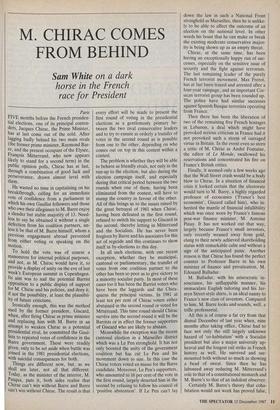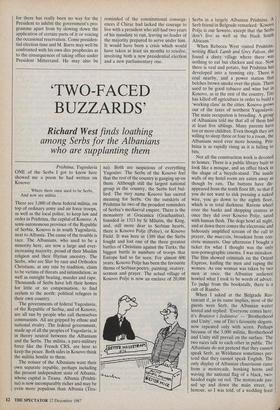M. CHIRAC COMES FROM BEHIND
Sam White on a dark
horse in the French race for President
Paris FIVE months before the French presiden- tial elections, one of its principal conten- ders, Jacques Chirac, the Prime Minister, has at last come out of the cold. After lagging badly behind his two main rivals (the former prime minister, Raymond Bar- re, and the present occupant of the Elysee, Francois Mitterrand, who now appears likely to stand for a second term) in the public opinion polls, Chirac has at last, through a combination of good luck and perseverance, drawn almost level with them.
He wasted no time in capitalising on his breakthrough, calling for an immediate vote of confidence from a parliament in which his own Gaullist followers and those who owe their allegiance to M, Barre enjoy a slender but stable majority of 13. Need- less to say he obtained it without a single defection from his coalition partners, un- less it be that of M. I3arre himself, whom a previous engagement abroad prevented from either voting or speaking on the motion.
To hold the vote was of course a manoeuvre for internal political purposes, and not, as M. Chirac would have it, to provide a display of unity on the eve of last week's European summit in Copenhagen. Its aim was to nail the potential Barrist opposition to a public display of support for M. Chirac and his policies, and deny it, if not the possibility, at least the plausibil- ity of future criticisms.
Ironically enough, this was the method used by the former president, Giscard, when, after firing Chirac as prime minister and replacing him with M. Barre in an attempt to weaken Chirac as a potential presidential rival, he committed the Gaul- lists to repeated votes of confidence in the Barre government. These were readily given, only to be set aside when battle was joined in the 1981 presidential elections, with suicidal consequences for both. Things are different now, but, as we shall see later, not all that different. Today, as the minister of the interior, M. Pasqua, puts it, both sides realise that Chirac can't win without Barre and Barre can't win without Chirac. The result is that every effort will be made to present the first round of voting in the presidential elections as a gentlemanly primary be- tween the two rival conservative leaders and to try to ensure as orderly a transfer of votes in the second round as is possible from one to the other, depending on who comes out on top in this contest within a contest.
The problem is whether they will be able to behave as friendly rivals, not only in the run-up to the election, but also during the election campaign itself, and especially during that critical period between the two rounds when one of them, having been eliminated from the contest, will have to stump the country in favour of the other. All of this brings us to the issues raised by the great betrayal of 1981 when Chirac, having been defeated in the first round, refused to switch his support to Giscard in the second, thereby letting in Mitterrand and the Socialists. He has never been forgiven by Bane and his associates for this act of regicide and this continues to show itself in by-elections to this day. In all such elections, with one recent exception, whether they be municipal, cantonal or parliamentary, the transfer of votes from one coalition partner to the other has been so poor as to give victory to a minority socialist party. In most of these cases too it has been the Barrist voters who have been the laggards and the Chira- quiens the principal victims. In 1981 at least ten per cent of Chirac voters either abstained in the second round or voted for Mitterrand. This time round should Chirac survive into the second round it will be the Barrists or in effect the former supporters of Giscard who are likely to abstain. Meanwhile the exception was the recent cantonal election in a Marseilles district which was a Le Pen stronghold. It has not only boosted the unity of the government coalition but has cut Le Pen and his movement down to size. In this case the Chirac voters voted en masse for the Barre candidate. Moreover, Le Pen's supporters, who amounted to 16 per cent of the vote in the first round, largely deserted him in the second by refusing to follow his council of `positive abstention'. If Le Pen can't lay down the law in such a National Front stronghold as Marseilles, then he is unlike- ly to be able to affect the outcome of an election on the national level. In other words his boast that he can make or break the existing moderate conservative major- ity is being shown up as an empty threat.
Chirac, at the same time, has been having an exceptionally happy run of suc- cesses, especially on the sensitive issue of security and the fight against terrorism. The last remaining leader of the purely French terrorist movement, Max Frerot, has at last been traced and arrested after a four-year rampage, and an important Cor- sican terrorist group has been rounded up. The police have had similar successes against Spanish Basque terrorists operating from France.
Then there has been the liberation of two of the remaining five French hostages in Lebanon, a deal which might have provoked serious criticism in France had it not provoked such a storm of outraged virtue in Britain. In the event even so stern a critic of M. Chirac as Andre Fontaine, the editor of Le Monde, swallowed his reservations and concentrated his fire on France's British critics.
Finally, it seemed only a few weeks ago that the Wall Street crash would be a body blow to Chirac. In a situation of financial crisis it looked certain that the electorate would turn to M. Bane, a highly regarded professor of economics (`France's best economist', Giscard called him), who in- herited the mantle of financial infallibility which was once worn by France's famous post-war finance minister, M. Antoine Pinay. It has not worked out that way, largely because France's small investors, only recently weaned away from gold, clung to their newly achieved shareholding status with remarkable calm and without a sign of the anticipated panic. Another reason is that Chirac has found the perfect counter to Professor Barre in his own minister of finance and privatisation, M. Edouard Balladur.
M. Balladur, with his aristocratic in- souciance, his unflappable manner, his immaculate English tailoring and his Jer- myn Street-style shirts, is an ideal nanny to France's new class of investors. Compared to him, M. Bane looks and sounds, well, a trifle professorial.
All this is of course a far cry from that dismal December of last year when, nine months after taking office, Chirac had to face not only the still largely unknown hazard of 'co-habitation' with a Socialist president but also a major university up- heaval and the longest rail strike in French history as well. He survived and sur- mounted both without so much as showing a bead of sweat. Since then he has laboured away reducing M. Mitterrand's role to that of a constitutional monarch and M. Barre's to that of an indolent observer.
Certainly M. Barre's theory that coha- bitation would not work has proved false, for there has really been no way for the President to inhibit the government's pro- gramme apart from by slowing down the application of certain parts of it or voicing the occasional reservation. Come presiden- tial election time and M. Barre may well be confronted with his own dire prophecies as to the consequences of taking office under President Mitterrand. He may also be reminded of the constitutional consequ- ences if Chirac had lacked the courage to live with a president who still had two years of his mandate to run, leaving no leader of the majority prepared to serve under him. It would have been a crisis which would have taken at least six months to resolve, involving both a new presidential election and a new parliamentary one.



























































 Previous page
Previous page